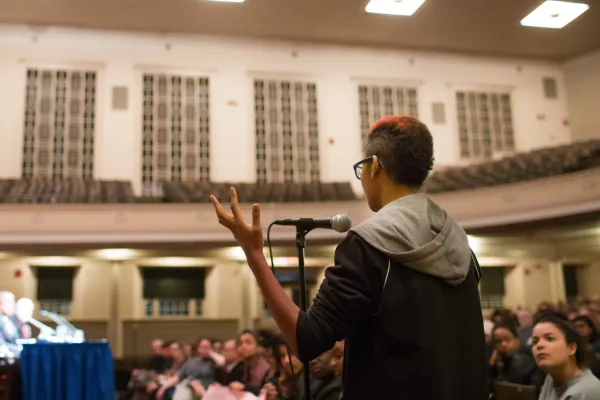Campus Town Hall Addresses Race Issues
News of Note

Published November 23, 2015
During a listening session on racism held Monday afternoon, President Kathleen McCartney acknowledged what she called the “slow pace of progress” toward making Smith a more diverse and inclusive community and affirmed her commitment to being a “supportive and steadfast ally” to students of color pushing for institutional change.
“A number of you told me that you are tired of the struggle you bear as students and that you expect more from Smith,” she said. “I want you to know that I have heard you, and I know there is more to hear.”
The town hall session, which drew students, faculty, staff and local alumnae to John M. Greene Hall, provided an opportunity for members of the community to share personal stories, provide ideas for change and raise concerns about a range of issues, from counseling support to free speech.
Chief Diversity Officer Dwight Hamilton said the event was organized in the spirit of improving Smith and ensuring that a range of opinions were heard as the college addresses similar issues of racism and racial injustices that are occurring on college campuses across the country. “Any transformative change has to have voices of the community at the table,” he said. “We hope today’s session can consider what our work should look like as we tackle these issues, and what change looks like moving forward.”
Vowing “real and sustained change on race at Smith,” President McCartney outlined a set of initiatives to address concerns about diversity among faculty and students. In particular, she pointed to recent work by Provost and Dean of the Faculty Katherine Rowe in securing nearly $1 million from the Mellon Foundation to recruit more of faculty of color. “I will identify additional funds to accelerate this work,” McCartney said.
She also noted that she has been working closely with Vice President for Enrollment Audrey Smith to increase the recruitment and enrollment of more students of color. “Going forward, we will further increase our outreach and recruitment efforts,” she said.
A desire for change and the need to move forward were themes that were echoed in many of the remarks from students who took to the microphones set up in John M. Greene Hall. One student called for additional support for low-income students of color. Beyond the need for more faculty and students of color, several students demanded social justice and sensitivity training for faculty so they are better equipped to discuss sensitive and difficult topics with students in class. “We can’t do our jobs as students if we don’t feel safe in our classrooms,” said one student.
Kristen Dorsey, a new member of the engineering faculty, noted that many faculty members in her department want to reach out to students but are often unsure how to do so because issues of racism and inclusion may not present themselves as natural parts of the curriculum. “We feel uncomfortable because we don’t want to give the impression that engineering doesn’t have a role to play or that we don’t care,” she said. Dorsey requested training “for how to talk about these issues with students to make it productive.”
Hamilton agreed that social justice training is an admirable goal, but suggested that “a foundation of intercultural competency” is needed.
Another student called on President McCartney to be more transparent about various anti-racism initiatives happening on campus. “Making transparent your work around issues of equity and social justice might provide a whisper in the silence currently occurring,” said one student.
A few students strongly disputed recent media coverage of a November 18 sit-in at the Campus Center during which members of the press were asked by organizers to declare their support for the students’ cause if they wished to cover the event. “There was no pushing and the media was not barred from the event,” said one student. “[It was a student-organized event] and the students had every right to set the rules.”
Others expressed frustration that their work to bring attention to racism on college campuses has been overshadowed by discussions about free speech. “The free speech argument is a diversion,” one student said.
President McCartney acknowledged the concerns, noting that discussions about free speech and student activism around racism need to be more nuanced. “The movement isn’t speaking with just one voice, but many,” she said. “We need to listen to them all.”
The town hall session followed a series of student-organized events over the past two weeks that included a lunchtime walkout to Chapin Lawn on November 11 and a sit-in at the Campus Center on November 18. The events reflected Smith students’ solidarity with other students at colleges and universities nationwide who are participating in protests, vigils, rallies, and sit-ins to bring attention to the racial injustices occurring on their campuses.
Hamilton assured students that the Office of Inclusion, Diversity and Equity is conducting a comprehensive campus climate survey to gather the experiences of all members of the Smith community and is in the process of developing a “tangible action plan for improving our community.”
He said that a goal of his is to follow the model used to change campus culture around issues of environmental sustainability. “Our sustainability efforts have become pervasive,” he said. “We don’t even think about it. That’s where we need to go with issues of diversity and inclusion.”